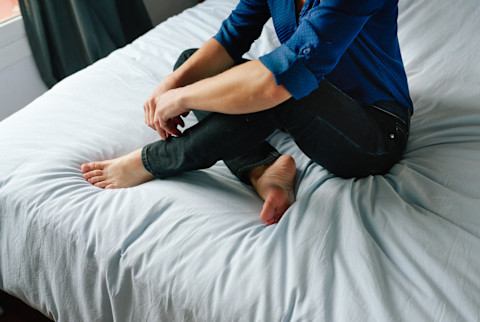
As vaccines roll out and restrictions ease, life is starting to return to normal across much of the country. But according to recent data by the American Academy of Sleep Medicine (AASM), our sleep might still be stuck in 2020.
What the latest sleep numbers say.
Last summer, the AASM confirmed what many of us suspected: The stress and unease of the pandemic were causing sleep disruptions across the country. Its July 2020 survey of 2,007 American adults found that around one-third of people reported COVID-19 was making their sleep quality worse.
To track how sleep patterns have shifted over the past year, the AASM conducted the same survey again this March. The results were counterintuitive: Despite the progress being made against the pandemic, our sleep appeared to be getting worse, not better. In this follow-up survey, 56% of Americans reported sleep issues due to COVID. Men, people ages 35 to 44, and people living in the Northeast were most likely to report "COVID-somnia."
"A lot of people thought that our sleep should be getting better because we can see the light at the end of the tunnel—but it's worse now than it was last year," Fariha Abbasi-Feinberg, M.D., a sleep medicine specialist and spokeswoman for the American Academy of Sleep Medicine, told the New York Times of these new numbers.
This paradox makes more sense when you consider the triggers of COVID-somnia—many of which are still very much present. For example, millions of people are still working from home and sleeping in later due to the lack of commute, which can throw off sleep rhythms. Looser schedules also mean more variation in bedtime and wake-up time, another potential threat to sleep quality. It's reasonable to think that those working from home are also still getting outside and moving their body less than they were in pre-pandemic days. And with social calendars beginning to fill up again, consumption of booze—a major sleep disrupter—is on the rise again. Finally, the lingering anxiousness surrounding the pandemic in the U.S. and abroad might be continuing to keep people up at night.
What to do about it.
If pre-pandemic sleep quality is still a distant dream for you, this survey shows you're not alone. When we asked Michael J. Breus, Ph.D., a clinical psychologist who specializes in sleep and sleep disorders, for his advice on how to get back on track after the throes of the pandemic, he gave us some best practices that still hold true: Make exercise and consistent movement a priority if you're still working from home, limit caffeine and booze as much as possible (especially later in the day), and get outside as often as you can—the earlier the better.
For a little extra support, you also might want to consider a sleep supplement. mbg's sleep support+ was formulated to help with the most common types of sleep challenges people mentioned in the AASM report: trouble falling and staying asleep.* The blend of magnesium bisglycinate, jujube, and PharmaGABA® calms the overactive mind and promotes relaxation to help you fall asleep faster, stay asleep longer, and wake up feeling rejuvenated.* While you can't out-supplement an unhealthy nighttime routine, when paired with good lifestyle choices, it's designed to help you sleep soundly through whatever life throws your way next.*

